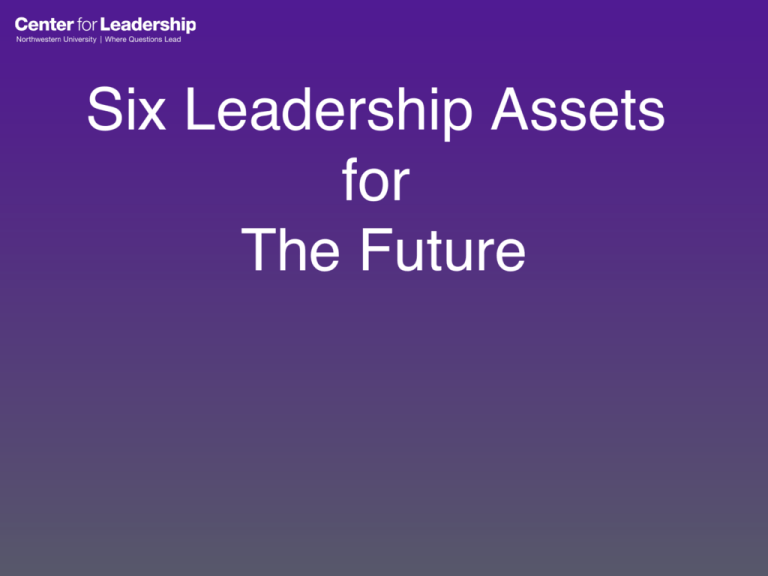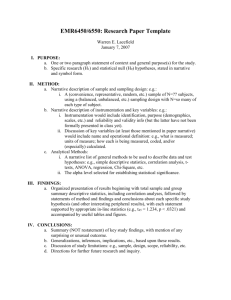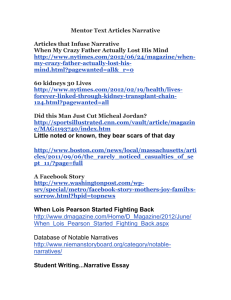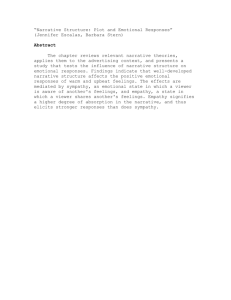
Six Leadership Assets
for The Future"
Six Leadership Assets
for The Future!
Where are we now?
An Opportunity to Construct the Future
"
Where Are We Going?
A place where the legislature becomes…"
-
-
-
A model of effective problem solving"
An inspiration to others for creative
adaptation and powerful collaboration"
A cornerstone for the future that is waiting to
be built."
How Do We Get There?
"
6 Leadership Assets:"
1. Resilience
2. Navigate and Lead Through Change
3. Asking Powerful Questions
4. Inspiring Others Through Narrative
5. Mobilizing Difference To Maximize Performance
6. Thrive in Collaborative and Hierarchical
"
Settings Asset-Based Leadership
Leadership Assets: Functions or Capacities required for effective
leadership
1. Resilience
Leaders are resilient. You can routinely overcome adversity and failure
by learning from your mistakes and adapting those lessons into your
future choices. Resilience also requires that you be brutally honest with
yourself about your shortcomings while also being relentlessly optimistic
about the opportunities in front of you.
Disruption:"
Significantly stressful events that shake us up
and disrupt the structures of the world around
us. "
"
"
"
"
Such episodes will involve distress – from
mild anxiety to profound anguish. "
Common Disruptions!
Normal Life Transitions:!
Setbacks:"
Adolescence"
Divorce or Breakup"
Starting College"
Job Loss"
Graduation"
Untimely death of someone close"
Marriage"
Career Setback"
Children"
Death of Parent"
(Basically, anytime life doesnʼt
work out the way you planned.)"
"
"
"
"
"
- Flach, Resilience"
Crucible Experiences!
Force you to wrestle with such questions as:"
-
-
-
-
!
!
!
What am I made of?!
What do I believe in?!
What lines will I not cross?!
What is really important to me?!
To Extract Insight:"
"
Reflect on your experience,"
Observe what it reveals to you, "
and going forward,"
Apply the knowledge you have gained. !
2. Navigate through
and lead change
Routinely solving clear problems that
have clear solutions is a sign of
effective management. Leaders work
in a different arena, one where
problems are difficult to define and
where there are multiple possible
right answers. This requires you to
continually learn so that you can
successfully navigate uncertain
environments using incomplete
information.
Navigating Through
and Leading Change"
How disruptive is the change?"
Management vs. Leadership"
Management is about coping with complexity.
Leadership is about coping with change. - Kotter, What Leaders Really Do
Managing vs. Leading"
Managing
Leading
• Planning and Budgeting
• Setting Direction
• Control
• Aligning People
• Organization, Staffing
• Motivating, Inspiring
Kotter, What Leaders Really Do
What is the proper response?
"
3. Ask powerful questions
People prefer to solve the problem that s right in front of
them. However, experienced leaders know that solving the
right problem is key to their success. So, effective
leadership begins with your ability to ask powerful
questions: questions that reveal the few clear and
profound truths about the opportunity or problem at
hand.
3. Ask Powerful Questions
A Good Start:
Problem-Oriented Questions:
- What are the symptoms?
- What is the problem?
- What is the cause?
- What is the solution?
Response-Oriented Questions:
- What is our plan?
- Who will do what?
- When will they do it?
- How will we know they’ve done it?
Team-Oriented Questions:
- How will we work together? - What are our team strengths?
- What are our team assets? 3. Ask Powerful Questions
A Good Start:
Drucker:"
1. What is our mission?"
2. Who is our customer (constituency)?"
3. What does the customer (constituency) value?"
4. What are our results?"
5. What is our plan?"
3. Ask Powerful Questions
A Good Start:
1. Where are we now?"
2. Where are we going?"
3. How will we get there?"
"
"
"
"
"
"
"
- Adam Goodman"
4. Inspire others through narrative
Thoughtful analysis and the
artful use of information
are essential tools for any
leader. Leaders must also
be able to weave these
tools with stories that
engage people and call
them to action.
We live in Narrative"
“This is what fools people: a man is always
a teller of tales, he lives surrounded by his
stories and the stories of others, he sees
everything that happens to him through
them; and he tries to live his life as if he
were telling a story.”
!!
- Jean-Paul Sartre"
The limits of an effective argument…
"
"
"
"
(Is this what your meetings look like?)"
The advantage of narrative…"
"
"
"
A Day in The Life…"
• Phone calls "
"
• Voice Mail Messages "
• E-Mail messages "
• Texts "
"
"
• Internet Pages "
"
• Television Screens "
"
"
"
"
"
"
"# per day?"
"# per day?"
"# per day?"
"# per day?"
"# per day?"
"# per day? "
Add lectures, books, magazines, etc. "
What do we do with all of this data?"
What is the MEANING of this
information, and what is the
PURPOSE?!
i.e."
"
"
"
The Problem: "
We are stuffed with data"
but!
starved for meaning. "
"
!
!
© Todd Murphy, All Rights Reserved"
Narrative and Meaning"
- By tapping into the wants, needs and goals of people,
narrative takes information and invests it with
meaning. "
"
- Stories help create cognitive structures that determine
how we filter information and put it together in a way
that makes sense to us. "
"
What does this mean?"
“A leader defines reality.”
- Max DePree
!
!
Narrative and Leadership"
"
What followers are asking leaders, especially in crisis:"
Interpret this for us.!
What does this mean?!
What is the story?!
What happens next?!
Where do we go from here?!
What is my role?!
!
!
Narrative and Leadership"
!
- Define the situation (journey, war, game, etc.)"
- Brings everyone together collaboratively"
- Engages both hearts and their minds. "
- Helps everyone know their role."
5. Mobilize difference to
maximize performance
Leadership is, by definition, a community act.
We don t lead ourselves; we lead others. Ideas
are only transformed into real results when you
mobilize others to take action. This asset is
especially valuable when you lead people who
come from backgrounds unlike your own.
Mobilize Difference to Maximize Performance"
Key Assumption:!
“Leaders donʼt emerge from factories with preprogrammed styles, habits or rules. Instead,
successful leaders understand and work from their
own strengths while building a team around them to
close needed gaps.” !
"
Mobilize Difference to Maximize Performance"
StrengthsFinder Research:"
Instead of one dominant leader who tries to do
everything, or individuals who all have similar talents,
the most cohesive and successful teams have a
representation of strengths in four domains:"
• Executing"
• Influencing"
• Relationship Building"
• Strategic Thinking"
- Rath and Conchie, Strength Based Leadership"
Four Pillars of A Successful Team!
Executing – Know how to make things happen"
Influencing – Help teams reach a broader audience"
Relationship Building – Hold teams together"
Strategic Thinking – Stay focused on what could be"
Individuals need not be well rounded"
but teams should be."
!
Leadership Assets
and Personal Strengths"
"
Assets refer to capacity"
(Can you do it?)"
"
Strengths refer to style"
(How do you do it?)"
Equifinality – An end can be reached by many potential means"
"
6. Thrive in collaborative
and hierarchical settings
Leaders often find
themselves working with
others in collaborative
and hierarchical arenas, so
you need mastery of both
environments. Collaborative settings are
characterized by shared
ownership, one where
problems and opportunities
are discovered among group
members, where action is
taken on behalf of the group,
and where success is defined
by the group.
Hierarchical settings require you to inspire
others who are accountable for results,
even though they are not decision makers.
A team effort is
a lot of people
doing what I say.
- Film Director
Michael Winner
Collaborative or Hierarchical?
"
"
-
What do people understand about themselves and one another?"
-
What do they understand about their circumstances?"
-
What is at stake?"
-
How high are the stakes?"
Questions?
"
For More Information:
Todd Murphy
Center for Leadership
1813 Hinman Avenue
Evanston, IL 60201 USA
+1 847 467-4661
Todd-Murphy@northwestern.edu
Thank you!"







